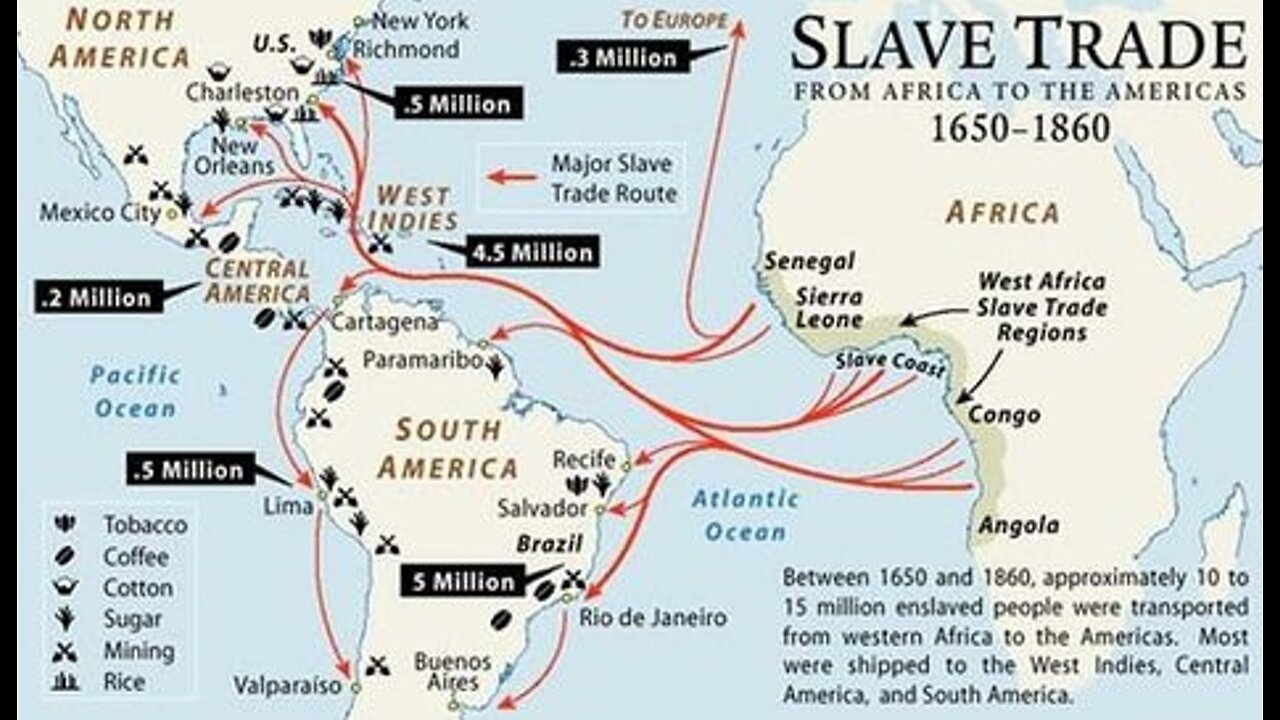Premium Only Content

Constitution 101 Course - Black Slave Total 4.4 million Population in the United States
Examine the history of slavery in America by looking at the complex, and often hypocritical views of slavery by the Founding Fathers and slavery’s relationship with America’s founding documents. National Constitution Center, explains how the Constitution and its amendments and the Declaration of Independence have been used as tools for abolition and civil rights throughout American history.
Black slaves played a major, though unwilling and generally unrewarded, role in laying the economic foundations of the United States—especially in the South. Blacks also played a leading role in the development of Southern speech, folklore, music, dancing, and food, blending the cultural traits of their African homelands with those of Europe. During the 17th and 18th centuries, African and African American (those born in the New World) slaves worked mainly on the tobacco, rice, and indigo plantations of the Southern seaboard. Eventually slavery became rooted in the South’s huge cotton and sugar plantations. Although Northern businessmen made great fortunes from the trade of enslaved peoples and from investments in Southern plantations, slavery was never widespread in the North.
As a result of the Union victory in the Civil War and the ratification of the Thirteenth Amendment to the Constitution (1865), nearly four million slaves were freed. The Fourteenth Amendment (1868) granted African Americans citizenship, and the Fifteenth Amendment (1870) guaranteed their right to vote. Yet the Reconstruction period (1865–77) was one of disappointment and frustration for African Americans, for these new provisions of the Constitution were often ignored, particularly in the South.
After the Civil War, the freedmen were thrown largely on their own meagre resources. Landless and uprooted, they moved about in search of work. They generally lacked adequate food, clothing, and shelter. The Southern states enacted Black codes, laws resembling the slave codes that restricted the movement of the former slaves in an effort to force them to work as plantation laborer's—often for their former masters—at absurdly low wages.
There were almost 700 thousand slaves in the US in 1790, which equated to approximately 18 percent of the total population, or roughly one in every six people. By 1860, the final census taken before the American Civil War, there were four million slaves in the South, compared with less than 0.5 million free African Americans in all of the US. Of the 4.4 million African Americans in the US before the war, almost four million of these people were held as slaves; meaning that for all African Americans living in the US in 1860, there was an 89 percent* chance that they lived in slavery.
In total, an estimated twelve to thirteen million Africans were transported to the North and South Americas as Slaves, and this does not include the high number who did not survive the journey (which was as high as 23 percent in some years). In the 150 years since the abolishment of slavery in the US, the African-American community have continuously campaigned for equal rights and opportunities that were not afforded to them along with freedom. The most prominent themes have been the Civil Rights Movement, voter suppression, mass incarceration and the relationship between the police and the African-American community has taken the spotlight in recent years.
-
 1:09:00
1:09:00
What If Everything You Were Taught Was A Lie?
1 month agoThe Nazi True 8 Secret SS Base's Vs. American Battle For Antarctica Full Top Secret Story Explained
3.18K4 -
 LIVE
LIVE
Badlands Media
10 hours agoBaseless Conspiracies Ep. 145
19,404 watching -
 2:50:50
2:50:50
TimcastIRL
4 hours agoTrump Deploys National Guard To DC, Federalizes Police, Liberals Protests Take Over| Timcast IRL
184K58 -
 2:27:36
2:27:36
Barry Cunningham
7 hours agoBREAKING NEWS: PRESIDENT TRUMP ABSOLUTELY NUKED WASHINGTON D.C. AND THE MEDIA!
55.8K38 -
 LIVE
LIVE
Drew Hernandez
9 hours agoTRUMP'S DC TAKEOVER & ISRAEL KILLS AL JAZEERA TEAM AHEAD OF GAZA INVASION
674 watching -
 1:19:05
1:19:05
Glenn Greenwald
5 hours agoTrump's DC Takeover: Is it Legal? Israel Kills More Journalists, Including Anas al-Sharif; Glenn Reacts to Pete Buttigieg and JD Vance on Israel | SYSTEM UPDATE #501
116K105 -
 44:40
44:40
Katie Miller Pod
5 hours ago $2.98 earnedEpisode 1 - Vice President JD Vance | The Katie Miller Podcast
38.7K12 -
 13:09:34
13:09:34
LFA TV
1 day agoLFA TV ALL DAY STREAM - MONDAY 8/11/25
210K20 -
 1:44:36
1:44:36
RiftTV
7 hours agoBREAKING: Trump FEDERALIZES D.C. To RESTORE Law & Order | The Rift | Ryan Matta, Olivia Krolczyk + Braeden Sorbo
50.6K16 -
 3:00:47
3:00:47
megimu32
5 hours agoOTS: Breakfast Nostalgia + Blind Chocolate Cereal Showdown… LIVE! 🍫🥣
41K2